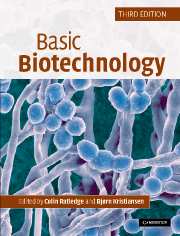Book contents
- Frontmatter
- Contents
- List of contributors
- Preface to the second edition
- Preface to the third edition
- Part I Fundamentals and principles
- Part II Practical applications
- Chapter 12 High-throughput screening and process optimisation
- Chapter 13 The business of biotechnology
- Chapter 14 Amino acids
- Chapter 15 Organic acids
- Chapter 16 Microbial polysaccharides and single cell oils
- Chapter 17 Environmental applications
- Chapter 18 Production of antibiotics by fermentation
- Chapter 19 Strategies of cultivation
- Chapter 20 Enzyme biotechnology
- Chapter 21 Recombinant proteins of high value
- Chapter 22 Insect and mammalian cell culture
- Chapter 23 Plant cell biotechnology
- Chapter 24 Biotransformations
- Chapter 25 Immunochemical applications
- Index
Chapter 25 - Immunochemical applications
Published online by Cambridge University Press: 05 June 2012
- Frontmatter
- Contents
- List of contributors
- Preface to the second edition
- Preface to the third edition
- Part I Fundamentals and principles
- Part II Practical applications
- Chapter 12 High-throughput screening and process optimisation
- Chapter 13 The business of biotechnology
- Chapter 14 Amino acids
- Chapter 15 Organic acids
- Chapter 16 Microbial polysaccharides and single cell oils
- Chapter 17 Environmental applications
- Chapter 18 Production of antibiotics by fermentation
- Chapter 19 Strategies of cultivation
- Chapter 20 Enzyme biotechnology
- Chapter 21 Recombinant proteins of high value
- Chapter 22 Insect and mammalian cell culture
- Chapter 23 Plant cell biotechnology
- Chapter 24 Biotransformations
- Chapter 25 Immunochemical applications
- Index
Summary
Glossary
Adjuvants Substances that when mixed with an antigen will make them more immunogenic, i.e. they enhance the immune response. Adjuvants cause inflammation and irritation and help to activate cells of the immune system.
Affinity The measured binding constant of an antibody for its antigen at equilibrium.
Alloimmunisation Immunisation of an animal with cells or tissues derived from another animal of the same species where there are allelic differences in their genes.
Antibody Adaptive proteins in the plasma of an immune individual with binding specificity for antigens (cf. immunoglobulin).
Antigen A molecule, or complex of molecules, that is recognised by an antibody (immunoglobulin) by binding to the antibody's variable or V-regions.
Antigen-presenting cells (APCs) An antigen-presenting cell is a specialised cell (dendritic cells and macrophages) that can ingest, degrade and then present on its cell surface, fragments of pathogens and other antigens, to other cells of the immune system (e.g. B-cells and T-cells).
Autoimmune Immunity to molecules (antigens) within an animal's own body that can lead to a disease, e.g. rheumatoid arthritis, or some forms of diabetes.
Avidity Antibodies frequently interact with antigen using multiple antigen-binding sites and thus they have a functional affinity termed avidity which is a complex function of the individual binding affinities.
B-cells A sub-set of white cells (lymphocytes) in the blood which produce antibodies.
- Type
- Chapter
- Information
- Basic Biotechnology , pp. 627 - 656Publisher: Cambridge University PressPrint publication year: 2006



